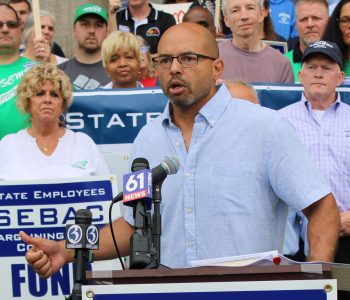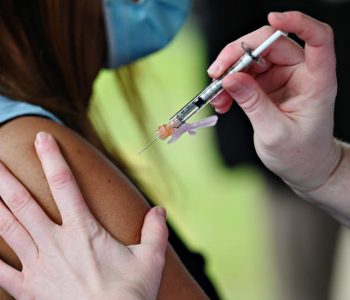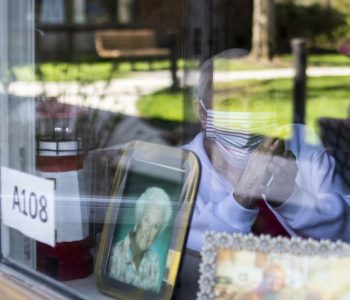Members of the legislature’s Black and Puerto Rican Caucus traveled the state Monday visiting nursing homes from Stamford to Hartford to let the workers know they have their backs.
Sen. Marilyn Moore, D-Bridgeport, said they want to make sure the workers, who are largely black and brown, know their lawmakers are looking out for them and are working to make sure they have enough personal protective equipment. She said they also want to make sure the workers know their rights.

“It’s just important for them to see us,” Moore said.
At Avery Heights in Hartford, the management at the home was unhappy the lawmakers showed up unannounced. Five or six workers came out onto a balcony to wave to lawmakers and thank them, but then quickly disappeared inside.
Last week, the state started testing all nursing home patients — there are about 22,000 of them in Connecticut — but the state didn’t mandate testing of the estimated 32,000 nursing home workers.
The American Health Care Association and the National Center for Assisted Living estimated it would cost $8.2 million to test every nursing home patient and every nursing home worker in Connecticut.
Pedro Zayas, a spokesman for SEIU 1199 NE, said last week that the unions were in favor of testing, but there needs to be some direction on when workers can get tested and whether they will be paid if they have to travel to a testing location to get a test.
The state, at the moment, is only providing enough testing kits for nursing home patients.
Josh Geballe, Lamont’s chief operating officer, said last week that they are hoping to test nursing home staff “on a more repetitive basis.”
Some nursing home chains have taken it upon themselves to get all their staff tested, but not all of them.
“We are a little frustrated by how long it’s taking to get the staff testing ramped up,” Geballe said last week. “There are some union-related issues that need to be resolved with the nursing home operators. We’re doing everything we can to try to support that and push that along.”
The Centers for Medicare and Medicaid Services issued guidance last week that called for nursing home workers to be tested on a weekly basis. The federal government recommended that “all nursing home staff (including volunteers and vendors who are in the facility on a weekly basis) to receive a single baseline COVID-19 test, with re-testing of all staff continuing every week (note: State and local leaders may adjust the requirement for weekly testing of staff based on data about the circulation of the virus in their community).”
Rep. Gerald Reyes, D-Waterbury, said he just went to a funeral for a nurse at Abbott Terrace Health Center in Waterbury who died as a result of contracting COVID-19.
Ilka Hernandez, 56, was a registered nurse and supervisor and a mother of five.
As of last Wednesday, 115 patients at Abbott Terrace Health Center tested positive and 43 have died, according to the Department of Public Health.
It’s imperative that workers get tested, Moore said.
.
“We’re depending on these workers to take care of these people in these nursing homes, but also to go back home and take care of their families,” Moore said. “And it’s just like a cycle.”
Moore said she’s heard some nursing home operators may be scared to test their workers because it would cause a staffing shortage.
“If they test too many, who is going to be here to take care of the patients?” Moore said.
Moore said they shouldn’t be using that as an excuse to not test the workers. She said they should have trained staff ready to come in if that happens.
As co-chair of the legislature’s Human Services Committee, Moore is on phone calls three times a week with state officials managing the pandemic. She said they need to offer better direction about testing availability and the need to go get tested.
“The essential workers should be a priority,” Moore said.
She said those who are tested need to be told when to expect the results and where to call if they don’t get the results within a certain period of time.
“What’s the follow up? What’s the procedure once a person goes to get tested?” Moore said.
Test results are not instantaneous. Many testing sites will require someone to wait three to five days for results.
The only testing site that’s offering results within a few minutes is the CVS testing site at Long Wharf in New Haven where they are doing the Abbott ID NOW rapid COVID-19 test.
Moore said urban areas need more testing sites and while they are beginning to see some improvement, it didn’t happen fast enough.
Reyes said the trek across the state Monday has opened lawmakers’ eyes for further digging into the situation at some of the nursing homes. He said workers at one home were concerned about having to use their vacation time if they got sick. There have also been concerns about payment.
He said Abbott Terrace Health Center and Regalcare of Waterbury have been testing their workers along with their patients. Reyes said he was told that Regcalcare is doing another round of testing this week.
“I’m a little surprised at how long it’s taken a lot of these facilities to test everybody,” Reyes said. “Inventory has been an issue, but if you’re running one of these facilities you would think your policy would be to test the workers.”
Written by Christine Stuart



